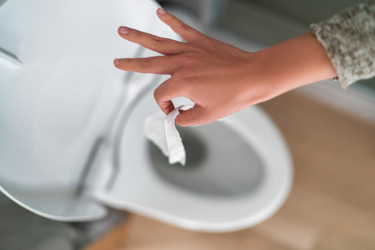Non-Flushable Wipes Fall Under Increased Mislabeling Scrutiny


Despite the fact that they are often mislabeled as “flushable,” disposable wipes that are used in households and then flushed into wastewater systems are a surprisingly large headache for buried infrastructure and the professionals who maintain it. In London, for instance, the wipes have congealed and mixed with other substances within the sewer to create a globule the size of a city bus.
But now, local regulation is emerging that will help consumers understand that this is not the appropriate way to dispose of these products.
“Oregon will become the second state in the U.S. to require that disposable wipes be labeled with ‘Do Not Flush,’ a triumph for water district officials and local governments in the state,” KDRV reported. “While many wipes are marketed as ‘flushable’ these days, the people that deal with the end result say that these products have been wreaking havoc on sewer and wastewater systems throughout the state of Oregon.”
This wastewater system damage has been an issue for as long as non-flushable wipes have been around, but the problems seemingly grew worse during the COVID-19 pandemic, as more consumers used them to disinfect their homes or turned to them as a replacement for toilet paper.
“Sewer systems across the country are warning customers not to flush those so-called ‘flushable’ wipes,” ABC 33/40 reported recently. “The products have been growing in popularity since the toilet paper shortage spurred by the pandemic. But unlike toilet paper which disintegrates in water, the wipes don’t break down.”
Washington was the first state to enact such labeling requirements last year, and similar legislation is pending in California, Illinois, Maine, Massachusetts, and Minnesota, per KDRV. It’s also possible that some federal legislation will soon be enacted. A 2020 National Association of Clean Water Agencies report found that the problem has caused an estimated $440 million in operational expenses for wastewater utilities.
“The COVID-19 pandemic exacerbated an already growing problem caused by a glut of products marketed as flushable, when in fact they were clogging and damaging residential and community pipes,” said Susie Smith, the director of the Oregon Association of Clean Water Agencies, according to KDRV. “We are grateful to the cities, agencies and legislators who championed this common-sense requirement.”
To read more about how non-flushable wipes damage wastewater infrastructure, visit Water Online’s Flushables Solutions Center.
